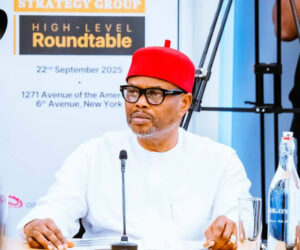“The child who is not embraced by the village will burn it down to feel its warmth.” — African proverb
This proverb reminds us that exclusion breeds destruction, while inclusion fosters growth. In business, employees who feel ignored may quietly disengage or even undermine the enterprise. Communities that feel exploited may resist a company’s growth. Fear, then, can extract obedience, but it rarely inspires commitment.
This is why the leadership philosophy known as Africapitalism, articulated by Tony Elumelu, matters. It suggests that Africa’s private sector should pursue profit in ways that also deliver social value—respecting people, communities, and the future. Far from being a slogan, Africapitalism echoes findings from one of the most influential management studies of our time: Built to Last by Jim Collins and Jerry Porras.
What Africapitalism and Built to Last share
In Built to Last, Collins and Porras studied visionary companies—those that endured across decades and outperformed competitors. They found that these firms were guided not only by profit but by a core ideology—a set of values and a sense of purpose beyond making money. Importantly, profits followed purpose, not the other way around.
Read also: Build Africa, powered by Oze, Launches ₦2 Billion in Credit to Empower Nigerian Property Builders
Africapitalism rests on the same foundation: businesses should embrace a dual mission—generating returns for investors while creating shared value for society. Tony Elumelu’s model emphasises long-term investment in people, fairness, and legacy. Just as Built to Last demonstrated, enduring success comes from aligning strategy with deeply held principles.
Lessons for entrepreneurs and business owners
1. Respect outlives fear
Built to Last shows that companies that imposed rigid control without purpose eventually faltered. Africapitalism teaches the same: employees perform better when they feel valued, not threatened. For a small business, this means creating a culture of fairness and recognition rather than relying on intimidation.
2. People are the true capital
Collins and Porras stressed the principle of “getting the right people on the bus.” Africapitalism echoes this: Africa’s greatest resource is its people. For entrepreneurs, investing in training and creating room for staff to grow is not charity—it is strategy.
3. Legacy is stronger than short-term wins
The visionary companies in Built to Last were those that built for generations, not quarters. Similarly, Africapitalism asks leaders to consider the footprint they leave behind. For SMEs, legacy could mean mentoring apprentices, upholding integrity in contracts, or serving the community. Profit without legacy is fleeting.
“In Built to Last, enduring companies attracted investors, customers, and employees because of consistent values. Africapitalism reinforces this: respect, fairness, and purpose build reputational capital—often more valuable than financial capital.”
4. Values attract trust and capital
In Built to Last, enduring companies attracted investors, customers, and employees because of consistent values. Africapitalism reinforces this: respect, fairness, and purpose build reputational capital—often more valuable than financial capital.
Why this matters in Africa today
The African business environment is volatile—high inflation, regulatory shifts, and infrastructure deficits. Under such pressure, the instinct may be to tighten control and lead with fear. But both Africapitalism and Built to Last show that resilience comes from the opposite: building cultures where respect, purpose, and values are embedded.
Read also: What the Africa HealthTech Summit 2025 must mean for Africa’s health future
A fearful workforce will obey but never innovate. A respected workforce, aligned with a bigger purpose, will stretch, improvise, and stay loyal. For business owners, the choice is clear: fear delivers obedience; respect inspires commitment.
Conclusion
The proverb reminds us: “The child who is not embraced by the village will burn it down to feel its warmth.” Businesses that fail to embrace employees, customers, and communities risk being undermined from within and without.
Africapitalism, articulated by Tony Elumelu, aligns with what Built to Last discovered in visionary companies worldwide: enduring success is built not on fear or short-term profits, but on respect, values, and purpose. For small business owners, this is not lofty theory—it is a practical guide. Lead with fear and you may secure compliance. Lead with respect, and you build enterprises that last.
Dr Olufemi Ogunlowo is the CEO of Strategic Outsourcing Limited, a leading provider of personnel and business process outsourcing services in Nigeria. He is also a regular columnist on employment and workforce strategy.









